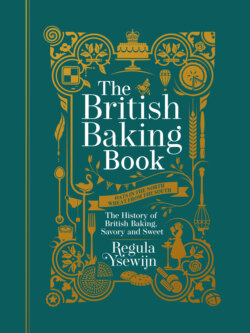Читать книгу The British Baking Book - Regula Ysewijn - Страница 6
На сайте Литреса книга снята с продажи.
Оглавление7
FOREWORD
I first met Regula when we were sitting in a London restaurant, filming a documentary on British puddings. She lit up the room
with her smile, her style, and her effervescent enthusiasm for British baked goods.
Growing up in the 1980s, my Britain was not like hers. It was far from that of quaint streets and polite customs. I read Austen,
Wordsworth, and Dickens at school under duress, and my holidays involved freezing on a rain-swept beach with a gritty picnic.
I grew up in a Britain in which the supermarket sticky bun was a Saturday treat, white sliced bread was king, and our village had
long since lost its bakery.
But even then, all was not lost, and I recognize that Regula’s fascinating Britain co-existed with my own gastronomically challenged
version. I envy Regula her travels as a teen, roving around a country I took for granted, eating flavors I would not encounter until, as
an adult and a historian, I deliberately sought them out. But while I never roved, I nevertheless ate. I remember curd tarts from my
Grandma’s local bakery, simultaneously sweet and savory and bitter with nutmeg. She made her own bread, and would smack our
fingers for stealing rolls, smothering them in butter while the loaves cooled on racks in her kitchen. I discovered a tiny back-street
bakery in the town where I spent my Saturdays, and together with a friend we would buy an apple tart for four and tear it apart, the
crust crumbling instantly to let us plunge hungry fingers into its fluffy interior.
By the 1990s the rediscovery of a rich and brilliant British culinary heritage was in full flow, and bakes that were teetering on
the edge of extinction – or had already disappeared completely – were being reinvented, brought back for a modern generation.
I moved to France, and only then did the unique nature of British baking really strike home. As I gorged on delicate gâteaux and
pastry confections, which no one would ever dream of making at home, I realized the fundamental truth that there are some things
that do not translate: cake, buns, puddings, and afternoon tea. (I’ll be fair, cake in French is le cake, pudding is le poudding and
afternoon tea is le five o’clock.) British baking isn’t about the ethereal, sweet treats of the pâtisserie, originally destined for the
dinner table; it offers you something more solid. Our bakes are sturdy, doughy, packed with fruit, spice, and flavor. They don’t dance
around your palate; they grab you and hug you, and tell you it’s all going to be all right.
Food tells us so much about who we are – as individuals, as communities, and as a nation. The myths we weave about foods are
so often invented, crumbling like shortbread when faced with the reality of life in the past. Yet the need to invent backstories, to
mythologize our pasties and our simnels is as valuable and as fascinating as the foods themselves. Reading this book, I’m reminded
of both how intensely local Britain could (and can) be, and yet how connected every tiny community, baking its own bun, was (and is).
Most of these recipes were born in the 18th century, a time of huge cultural and social change. Britain was busy abroad, exploring,
trading, colonizing, and it was a time of enormous scientific and artistic discovery, as well as unbelievable exploitation and cruelty.
Those who baked or ate baked goods were all playing their part. Sugar came from the West Indies, spice from the East. In the
19th century, strong flour was imported from Eastern Europe and Northern America, eggs from France, and butter from Ireland.
Yet locality was also crucial – the South favored wheat, the North clung to its oats. Ovens were rarer in the North than the South,
and fuel types and working conditions also played a role in cementing the specialities of each area. But it is the interplay of these
practicalities, along with the stories – whether true or invented – which make a whole so much greater than either on their own.
That, then, is the joy of this book. It’s a love letter to British baking and all that that implies. It brings together buns and bakes
that you’ll find in every local shop, and cakes and breads that have long since disappeared. Here you’ll find recipes both old and
new, resurrected for the future, together with the stories that make them such a window onto both the past and the present.
The joy of Regula’s writing is that through it all, we realize that it takes an outsider looking in to show us who we truly are.
This is a beautiful book. It is a lyrical book. It is a book full of good things, modern and old, with a multitude of real heritage
and imagined tradition behind them. Enjoy.
— Dr Annie Gray, food historian
